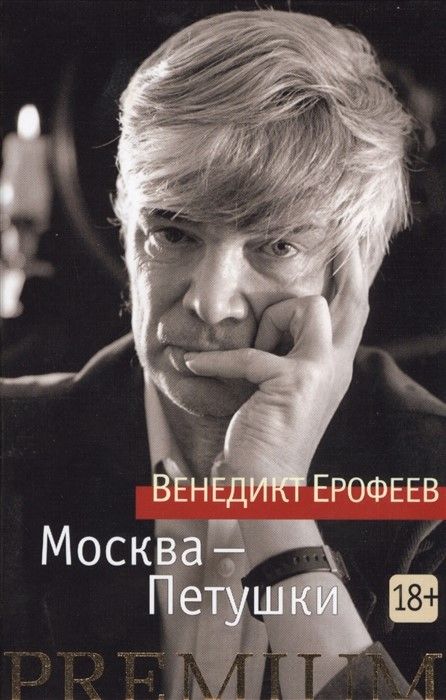
农妇,母语一般,其他语言更一般,但这些都没有能阻挡我对各种语言和文字的热爱,哪怕是看看也好。
The person who will satirize Russia the most is his own people
I heard anecdotes on a podcast that the prohibition of alcohol in the Soviet era led the people to give full play to their collective wisdom and use all the resources at hand to make alcohol. Thinking, but with incredible raw materials such as toilet water and pesticides. So it makes sense for us to call Russia a fighting nation, even though it's basically a mindless stereotype. Since the program mentioned that the source of these recipes is a book called "From Moscow to Petushki", I looked for it. The so-called not drinking a few glasses is not understanding this book, I agree, because the author himself is an alcoholic, and the state of drunkenness he describes is said to be very real.
This is a long, pseudo-autobiographical, prose poem by a not-so-famous Russian author, Venedikt Yerofeev, about a cable-installation commando captain who had just been fired for his alcoholism ( only for 4 weeks) story. This work is also a typical Soviet-era "we pretend to work, and they pretend to pay us" work: the endless cycle of cables being put down, pulled out, thrown away, and put back in the same area. The plot is that a drunk man is talking about things in a row, and readers will basically read it very easily from beginning to end. However, anyone with a little knowledge of history knows that this is a satirical drama about Soviet society and politics in the 20th century, but the way of ridicule is more unique and more direct to various malpractices. This may be one of the reasons why some people call Erofeev a postmodern writer.

The story of this book is very simple. Venechka, the protagonist of the same name as the author, leaves Moscow, which is incompatible with him, every Friday, and takes a commuter train to Petushki, a small town 120 kilometers away, with his lover. But this time it was the last time he went to Petushki, because at the end of the story, the protagonist was finally murdered on the street, he was stabbed to death in the throat. In real life, it is the throat cancer caused by alcoholism that took the author's life, which may not be a coincidence, but a kind of fate.
Venechka drank and talked in a variety of unrestrained ways all the way, and the content was all about the meaning of alcohol in life, which made readers laugh. Among them, there are about dozens of alcoholic beverages. This series of satires by the author is to illustrate the necessity of alcohol for survival in the Soviet Union, a person needs to drink to become a part of Soviet society. And he interspersed various Russian and Soviet cultural classics, biblical texts, Soviet propaganda, etc., so that the most serious words became the catalyst for the most absurd plots.
For example this paragraph:
I won't tell you how to refine the polish—every child knows it. For some reason, no one in all of Russia knew the cause of Pushkin's death - but everyone knew how to extract furniture polish.
Anyway, write down the formula of "Anoint of Canaan" first: (because one of our main theme writers once wrote, "A man has only one life, and his life should be spent like this, that is, not on the formula make mistakes.")
This sentence about human life , I believe people who have received education in mainland China, should be familiar with it. It comes from a book "How Steel Is Tempered". This is how his life should be spent. When he looks back on the past, he will not regret for wasting his time..." Venedikt Yerofeev quoted and modified slightly, with endless irony.
There is a reason why the author can get the classics at his fingertips. Erofeev was born in 1938 and grew up in Kirovsk in the Arctic region. After Moscow University, he dropped out due to boredom, and from then on he fell in love with alcohol. As his relatives say, the young man was unwilling, and in fact resisted, to follow the traditional rules of Soviet society, and his father was arrested for participating in anti-Soviet propaganda. The final destination of a literary genius is to become a lineman, similar to the work Venechka does in this book: simple and mindless, work is to go to drink after get off work.

Heavy drinking was a tradition in Russia, which was a dilemma for both the Tsarist and the Soviet governments, as alcohol was the main source of tax revenue, but alcoholism became a social problem, so Prohibition occurred in both periods. But if there is a ban, there will be a reverse, and the cat-and-mouse game has never stopped. And this story, with a tragic ending, expresses the author's prevalent thoughts at a time when the anti-alcohol movement was on the rise.
However, the author himself was also ridiculed. His almost babbling work might not have been planned to be published. It was only circulated in the circle of friends, but somehow it reached Israel. In 1973, Israel's Russian-language magazine (АМИ) had a unique vision and serialized "From Moscow to Petushki" in two issues. After more than ten years of incense outside the wall, at the end of 1988, this book was officially launched in the Soviet Union by the magazine "Alcoholism and Culture". A work of drunken stream of consciousness was labeled as anti-alcoholism, and attracted by the gimmick of "Confessions of a Russian Alcoholic", the book was also famous in his home country, and Yerofeev himself was probably dumbfounded.
The book has a level of chaos in its narrative and storytelling, but also justified because the narrator is drunk. It shows the loopholes in the Soviet social system from the "drunk" perspective of an alcoholic. It is a funny description of the Soviet Union's anti-alcohol period. I believe readers will come to the conclusion that the more anti-drinking, the more drinking.
I can't read the original text, but I feel that there are some deletions in the Chinese version, whether it is sexual description or a mockery of certain institutions. In addition, the Chinese version is translated from the English version, and it has been sold three times, so there are some losses, but even so, the flaws are not concealed. Again, the Chinese version of this book is fortunately released early, and the current mainland will not allow such a book to pass the trial.
I don't know why, but what I remember most clearly from this book is the recipes for various cocktails, such as this "Women's Youth League Tears":
15g lavender, 15g verbena, 30g "forest water" toilet water, 2g nail polish, 150g mouthwash, 150g soda water
I wonder if this kind of joke can only be laughed at by people who grew up under socialism.
This book can be read online: http://www.zhiqiu.net/congmosikedaopeitushiji/
Like my work?
Don't forget to support or like, so I know you are with me..
Comment…